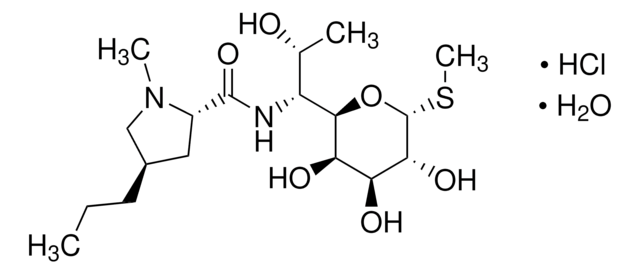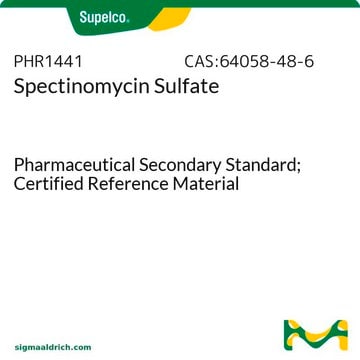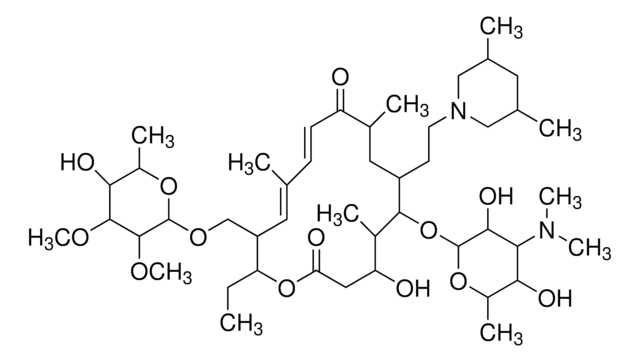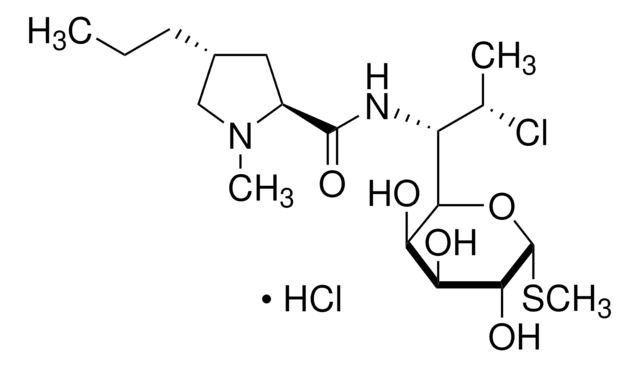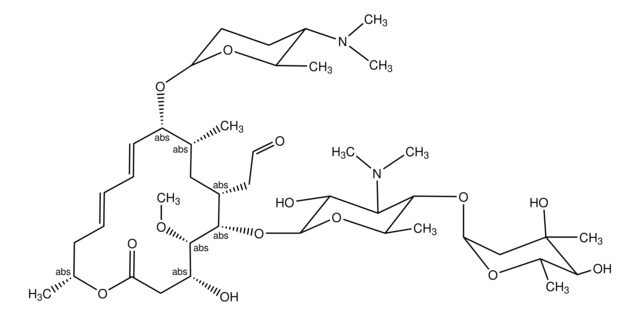62143
Lincomycine hydrochloride
96.0-102.0% (HPLC)
Synonyme(s) :
Lincocin hydrochloride, Methyl 6,8-dideoxy-6-(1-methyl-4-propyl-2-pyrrolidinecarboxamido)-1-thio-D-erythro-α-D-galactooctopyranoside hydrochloride
About This Item
Produits recommandés
Niveau de qualité
Pureté
96.0-102.0% (HPLC)
Forme
powder or crystals
Impuretés
≤5% water
Couleur
white to off-white
Solubilité
H2O: 50 mg/mL, clear, colorless to faintly yellow
Spectre d'activité de l'antibiotique
Gram-positive bacteria
Mode d’action
protein synthesis | interferes
Température de stockage
2-8°C
Chaîne SMILES
Cl.CCC[C@@H]1C[C@H](N(C)C1)C(=O)N[C@H]([C@@H](C)O)[C@H]2O[C@H](SC)[C@H](O)[C@@H](O)[C@H]2O
InChI
1S/C18H34N2O6S.ClH/c1-5-6-10-7-11(20(3)8-10)17(25)19-12(9(2)21)16-14(23)13(22)15(24)18(26-16)27-4;/h9-16,18,21-24H,5-8H2,1-4H3,(H,19,25);1H/t9-,10-,11+,12-,13+,14-,15-,16-,18-;/m1./s1
Clé InChI
POUMFISTNHIPTI-BOMBIWCESA-N
Vous recherchez des produits similaires ? Visite Guide de comparaison des produits
Catégories apparentées
Description générale
Actions biochimiques/physiologiques
Antimicrobial spectrum: Lincomycin hydrochloride is effective against gram-positive bacteria.
Notes préparatoires
Autres remarques
Mention d'avertissement
Warning
Mentions de danger
Conseils de prudence
Classification des risques
Eye Irrit. 2 - Skin Irrit. 2 - STOT SE 3
Organes cibles
Respiratory system
Code de la classe de stockage
11 - Combustible Solids
Classe de danger pour l'eau (WGK)
WGK 2
Point d'éclair (°F)
Not applicable
Point d'éclair (°C)
Not applicable
Équipement de protection individuelle
dust mask type N95 (US), Eyeshields, Gloves
Certificats d'analyse (COA)
Recherchez un Certificats d'analyse (COA) en saisissant le numéro de lot du produit. Les numéros de lot figurent sur l'étiquette du produit après les mots "Lot" ou "Batch".
Déjà en possession de ce produit ?
Retrouvez la documentation relative aux produits que vous avez récemment achetés dans la Bibliothèque de documents.
Les clients ont également consulté
Articles
Antibiotics targeting bacterial ribosomes disrupt protein synthesis, a key process in bacterial growth inhibition.
Antibiotics targeting bacterial ribosomes disrupt protein synthesis, a key process in bacterial growth inhibition.
Antibiotics targeting bacterial ribosomes disrupt protein synthesis, a key process in bacterial growth inhibition.
Antibiotics targeting bacterial ribosomes disrupt protein synthesis, a key process in bacterial growth inhibition.
Notre équipe de scientifiques dispose d'une expérience dans tous les secteurs de la recherche, notamment en sciences de la vie, science des matériaux, synthèse chimique, chromatographie, analyse et dans de nombreux autres domaines..
Contacter notre Service technique